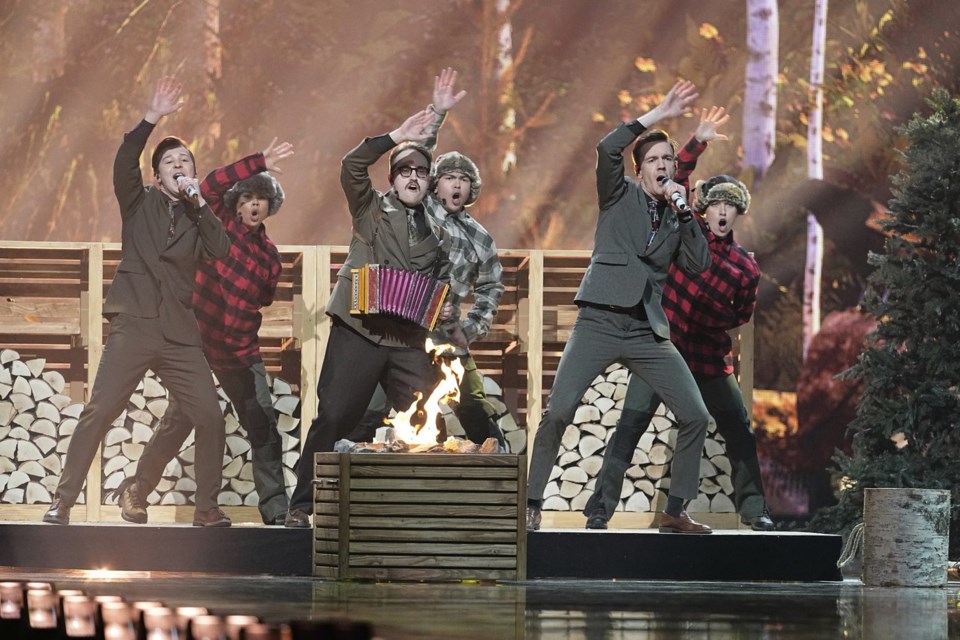BASEL, Switzerland (AP) — The world’s largest live music event has reached its glitter-drenched conclusion with the grand final on Saturday of the , a celebration of over Israel’s participation.
A trio singing for Sweden about the joys of saunas and a classically trained Austrian countertenor are among those tipped to take the microphone-shaped Eurovision trophy at the contest in .
But at the ever-unpredictable event, the prize could just as easily go to powerful singers from France, the Netherlands or Finland — or even an Estonian who sings about Italian coffee. The final kicks off at 9 p.m. local time.
Sweden's sauna song is a favorite
Bookmakers say the favorite is with their ode to sauna culture “Bara Bada Bastu,” followed by Austrian singer JJ’s pop-opera song “Wasted Love.”
French chanteuse Louane has risen up the odds with “maman,” as has Dutch singer Claude with soulful ballad “C’est La Vie” and Finland’s Erika Vikman with the innuendo-laden “Ich Komme.” is also a contender with his highly caffeinated dance-pop song “Espresso Macchiato.”
has won many fans with her anthemic “New Day Will Rise,” but also faced protests from pro-Palestinian demonstrators calling for Israel to be kicked out of the contest over its conduct of the .
Acts from 26 countries — trimmed from 37 entrants through — will perform to some for the continent’s pop crown. No smoke machine, jet of flame or dizzying light display has been spared by musicians who have 3 minutes to win the viewers who, along with national juries of music professionals, pick the winner.
The live show is also set to feature a guest performance by — who won last year’s contest in Sweden — and a face-off between two fan favorites: Baby Lasagna of Croatia, the 2024 runner up with “Rim Tim Tagi Dim,” and Finland’s Käärijä, whose rap-pop party anthem “Cha Cha Cha” came second in 2023.
There are also rumors of an appearance by Celine Dion. Before she was a global star, the Canadian chanteuse won Eurovision in 1988, competing for Switzerland. She sent a video message to one of the semifinals, where three singers performed her winning song, “Ne partez pas sans moi” (Don’t Leave Without Me).
An eclectic competition
Dean Vuletic, an expert on the history of Eurovision, said the competition has become more diverse over the years, both musically and linguistically. There are songs in 20 languages this year, including Ukrainian, Icelandic, Albanian, Latvian and Maltese.
“In the past it was about having a catchy, innocuous pop song, usually in English,” he said. But in the past decade “we’ve seen songs become much more socially and politically engaged, songs that present the audience with some sort of meaning."
“In recent years the formulaic approach to a Eurovision entry hasn’t succeeded," he added. "An entry needs to be memorable and it needs to be authentic in order to succeed these days.”
This year’s contest has been roiled for a second year by disputes over Israel’s participation. Dozens of former participants, including Switzerland's Nemo, have called for Israel to be excluded.
Pro-Palestinian and pro-Israel protests have both taken place in Basel, though on a much smaller scale than at last year’s event in Sweden, where tensions spilled over backstage and Dutch competitor Joost Klein was expelled over an alleged altercation with a crew member.
The European Broadcasting Union or EBU, which runs Eurovision, subsequently tightened the contest’s code of conduct, calling on participants to respect Eurovision’s values of “universality, diversity, equality and inclusivity” and its political neutrality.
Performers say the backstage vibe this year is more relaxed.
After a controversial ban in 2024 on flags, apart from national ones, being waved in the arena, this year audience members can bring Palestinian flags or any others, as long as they are legal under Swiss law. Performers, though, can only wave their own country’s flag.
Axel Åhman, one third of favorites KAJ, acknowledged that it’s tough to keep Eurovision an unpolitical event.
“The world always seeps in in some sense,” he told the AP. “But we’re here to represent Sweden and we have prepared for this for all our lives and want to make the best of our moment as artists in this huge and legendary competition.
"So our main focus is there, and the politics (we) try to leave that to the EBU and those actually making the decisions.”
Eurovision director Martin Green told reporters that the organizers' goal was to ”re-establish a sense of unity, calm and togetherness this year in a difficult world.”
“All 37 delegations, in difficult times, have behaved impeccably,” he said.
___
Associated Press journalists Hilary Fox and Kwiyeon Ha contributed to this report.
Jill Lawless, The Associated Press



